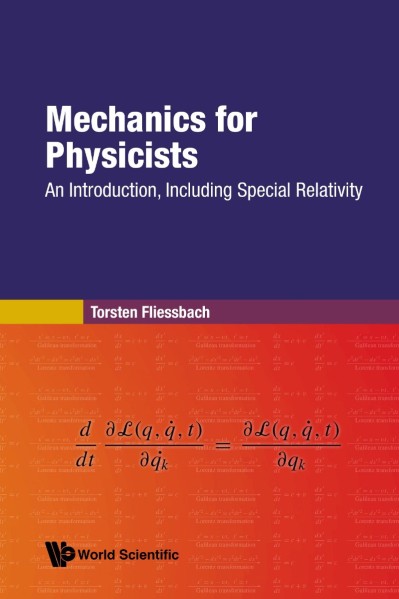
pdf | 17.01 MB | English | Isbn:9789811284595 | Author: Torsten Fliessbach | Year: 2024
About ebook: MECHANICS FOR PHYSICISTS: An Introduction, including Special Relativity
This textbook introduces the field of mechanics, commonly offered at universities in Germany as part of structured courses in theoretical physics.
Within the framework of elementary Newtonian mechanics, the basic concepts - such as trajectory curves, mass point, equations of motion, reference frames - are introduced. The focus is placed on the Lagrangian formalism (Lagrangian equations of the first and second kind, Hamilton's principle, conservation laws, Noether's theorem, etc.) and its most important applications (e.g.: motion in a central potential, dynamics of a rigid body and harmonic oscillations). The Hamilton formalism is then introduced in a compact way and continuum mechanics is presented through illustrative examples, such as string vibrations, beam bending, elementary hydrodynamics, sound waves, and more. The book also deals in detail with special relativity (principle of relativity by Einstein, length contraction, time dilation, relativistic equation of motion, production of heavy particles, twin paradox, etc.), and is supplemented with an appendix that examines the relation between the Newtonian force and the Minkowksi force.
Contents:[*]Preface
[*]Introduction
[*]Elementary Newtonian Mechanics:
[*]Trajectory
[*]Newton's Laws
[*]Conservation Laws
[*]System of Mass Points
[*]Inertial Frames
[*]Accelerated Reference Frames[*]Lagrangian Formalism:
[*]Lagrange's Equations of First Kind
[*]Applications I
[*]Lagrange's Equations Second Kind
[*]Applications II
[*]Space-Time Symmetries[*]Variational Principles:
[*]Variation without Constraint
[*]Variation with Constraint
[*]Hamilton's Principle
[*]Noether's Theorem[*]Central Potential:
[*]Two-Body Problem
[*]Kepler Problem
[*]Scattering[*]Rigid Body:
[*]Kinematics
[*]Inertia Tensor
[*]Tensors
[*]Euler's Equations
[*]Heavy Gyroscope[*]Small Oscillations:
[*]Forced Oscillations
[*]System with Many Degrees of Freedom
[*]Applications[*]Hamiltonian Formalism:
[*]Canonical Equations
[*]Canonical Transformations
[*]Hamilton-Jacobi Equation[*]Continuum Mechanics:
[*]String Vibration
[*]Beam Bending
[*]Hydrodynamics
[*]Field Theories[*]Relativistic Mechanics:
[*]Relativity Principle
[*]Length and Time Measurement
[*]Lorentz Group
[*]Lorentz Tensor
[*]Equation of Motion
[*]Applications
[*]Lagrange Function[*]Newtonian Force and Minkowski Force
[*]IndexReadership: Undergraduates in physics and engineering.
Key [b]Features:[/b][*]Successful German version (Springer), currently available in 8th edition
[*]Very positive feedback from students and professors
[*]Concise, compact and comprehensible presentation of the contents
[*]The approach is more intuitive instead of deductive
[*]Chapters are coherent, which allows focus on selective areas if desired
[*]Especially clear-cut introduction of the Lagrangian formalism
[*]Introduction into variational calculus (including examples like brachistochrone or catenary), leading eventually to Noether's theorem
[*]Introduction to continuum mechanics via illustrative examples (like sting vibrations, beam bending, sound waves). Thereby, the basic concepts of field theories are presented
[*]Thorough and clear-cut introduction to the theory of Special Relativity
[*]The present edition is enriched by a clear and detailed discussion of the correct relation between the Newtonian force and the Minkowski force. The author gives the formal derivation of the correct relation and discusses the practical and logical relevance of the different statements in the literature
https://rapidgator.net/file/1eae252a2e71853d23cd511549c9fa73/
https://filestore.me/og8ug4esm90s

